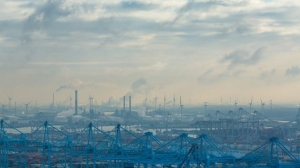


(Posted on 13/04/23)
CO2 emissions from industry and power plants in the port of Rotterdam were reduced by 1 Mtonne (4.2%) in 2022 compared to 2021. This brings emissions back to 2020 levels after an increase in 2021.
The decrease was mainly driven by the chemical sector and industrial gas producers. Because of high natural gas prices, they scaled back their production. As a result, they emitted a total of 0.8 Mtonne (16%) less CO2 than in 2021.
The high gas prices also caused the three gas-fired power plants in the port area to reduce operating hours, while increasing those of the two coal-fired power plants. Coal-fired power plants were given room to do this by the government by lifting the 35% capacity limitation imposed after the war in Ukraine broke out. CO2 emissions from coal-fired power plants increased by 6% (+0.3 Mtonne). However, this was more than offset by a 16% drop in emissions by the gas-fired power plants (-0.4 Mtonne). Altogether, coal and gas-fired power plants generated less electricity than in the previous year, as more and more electricity in the Netherlands is produced by wind turbines and solar panels.
Production at refineries remained stable due to high diesel demand, with CO2 emissions decreasing slightly (0.1 Mtonne, -1%).
In order to reduce the port’s CO2 emissions by 55% in 2030 compared to 1990, in line with the European and Dutch ambition, an annual CO2 reduction of 13.2 Mtonnes must be achieved in the port. Projects that industry, the Port Authority and partners are now working on in the port area add up to a reduction of 13.7 Mtonnes per year. These include projects such as Carbon Capture and Storage (Porthos), electrification of industry and use of shore power for shipping. The production of biofuels in particular leads to a substantial additional reduction in CO2 emissions outside the port. Altogether, with projects under preparation and implementation, the industry can achieve over 40% of the Netherlands’ CO2 reduction target by 2030. This figure does not include the import of hydrogen as an alternative for fossil energy.
With this year’s Rail Conference “Rail Freight Transport and Seaports”, a joint initiative... Read more
Asian Bulk Logistics (ABL Group) and ICG have jointly announced the successful completion of ABL&rsquo... Read more
Abu Dhabi based AD Ports Group, a leading global enabler of integrated trade, industry and logistics... Read more
The Executive Board of Hamburger Hafen und Logistik AG (HHLA) has appointed Patrick Krawutschke as Managing... Read more
Abu Dhabi based AD Ports Group, a global enabler of integrated trade, transport, industry, and logistics... Read more
This year marks a significant milestone in maritime innovation as Port Hedland, Australia, celebrates... Read more
Associated British Ports (ABP), the UK’s leading port operator, has announced the latest tranche... Read more
During the Investment, Labour, and Trade Promotion Programme in Japan (November 16–22, 2025),... Read more
AD Ports Group subsidiary Khalifa Economic Zones Abu Dhabi - KEZAD Group, the largest operator of integrated... Read more
Abu Dhabi based AD Ports Group, a global enabler of integrated trade, transport, industry, and logistics... Read more